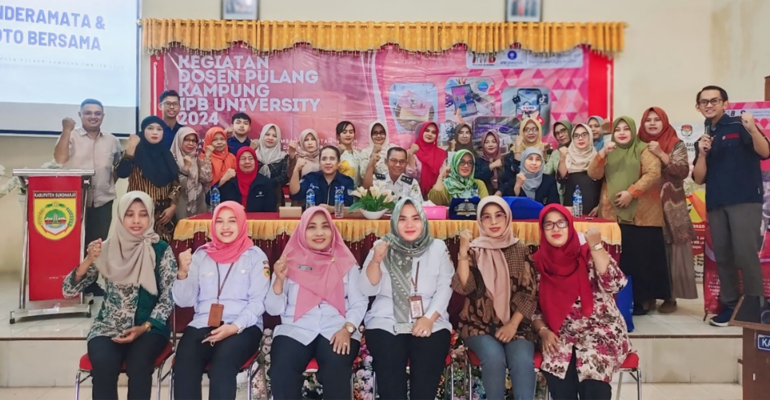IPB University Dosen Pulang Kampung Program Empowers Triyagan Community, Process Used Cooking Oil into Soap and Candles

In order to increase the added value of household waste, IPB University through the Dosen Pulang Kampung (Dospulkam) program held training on processing used cooking oil waste into economically valuable products in the form of soap and aromatherapy candles.
A total of 25 housewives, representatives of family welfare empowerment (PKK) and RT/RW, attended the training held at Triyagan Village Hall, Sukoharjo, Central Java, for two days.
Through this training, the community is expected to be able to reduce household waste and increase income through marketable environmentally friendly products.
Triyagan Village Chief, Pardiyanto, expressed his support for community empowerment programs such as the Dosen Pulang Kampung program designed by IPB University.
At the beginning of the training, Dr Emmy Darmawati, a member of the Dospulkam team, led a pre-test to measure the participants’ initial knowledge of used cooking oil and its impact on the environment.
Next, Dr Dyah Wulandani explained in detail about used cooking oil, its negative impact on the environment, and various ways to use it to mitigate the negative impact of used cooking oil on the environment. Participants gained new insights into how used cooking oil, which can pollute the environment, can be processed into high-value products.
In the core event, participants were invited directly to practice the purification of used cooking oil and its odor removal using the hot process. The clear and odorless used cooking oil was then processed into solid soap through cold process.
The participants were also taught to process used cooking oil into solid aromatherapy candles with various interesting shapes and liquid candles. With intensive guidance from the student facilitators, the participants were very active and enthusiastic. They discussed and asked each other questions, ensuring that each step was well understood.
By the end of the training, the participants had made a variety of shapes, colors, and scents of soap and aromatherapy candles. They kept these products for the second day of training on digital marketing. The results of the participants’ work demonstrate the technical mastery and skills they have learned. These skills become the capital to develop the economic potential based on used cooking oil in Triyagan Village.
At the end of the event, Dr Nanik Purwanti as the Chairperson of the IPB University team emphasized several things related to occupational safety and health (K3) aspects in processing used cooking oil into soap and aromatherapy candles to always be remembered by the training participants. She also expressed her pride and appreciation to all participants who had actively participated.
“I am very proud and appreciate all participants who have actively participated in this activity. I hope that the knowledge and skills gained during this training can be applied in their respective homes and provide long-term benefits for families and the surrounding environment,” she said.
Positive impressions were also conveyed by the participants. They felt greatly helped by this training and hope that similar activities can continue to be held in the future. “We are very happy with this training. We got a lot of new knowledge, and we hope we can continue to develop these products to increase family income,” said one of the participants.
With the end of this event, IPB University through the Dospulkam program shows its commitment to continue to make a real contribution to the community. Innovation and community empowerment is one of the keys to creating a cleaner environment and a more sustainable economy. (IAAS/Hap)



